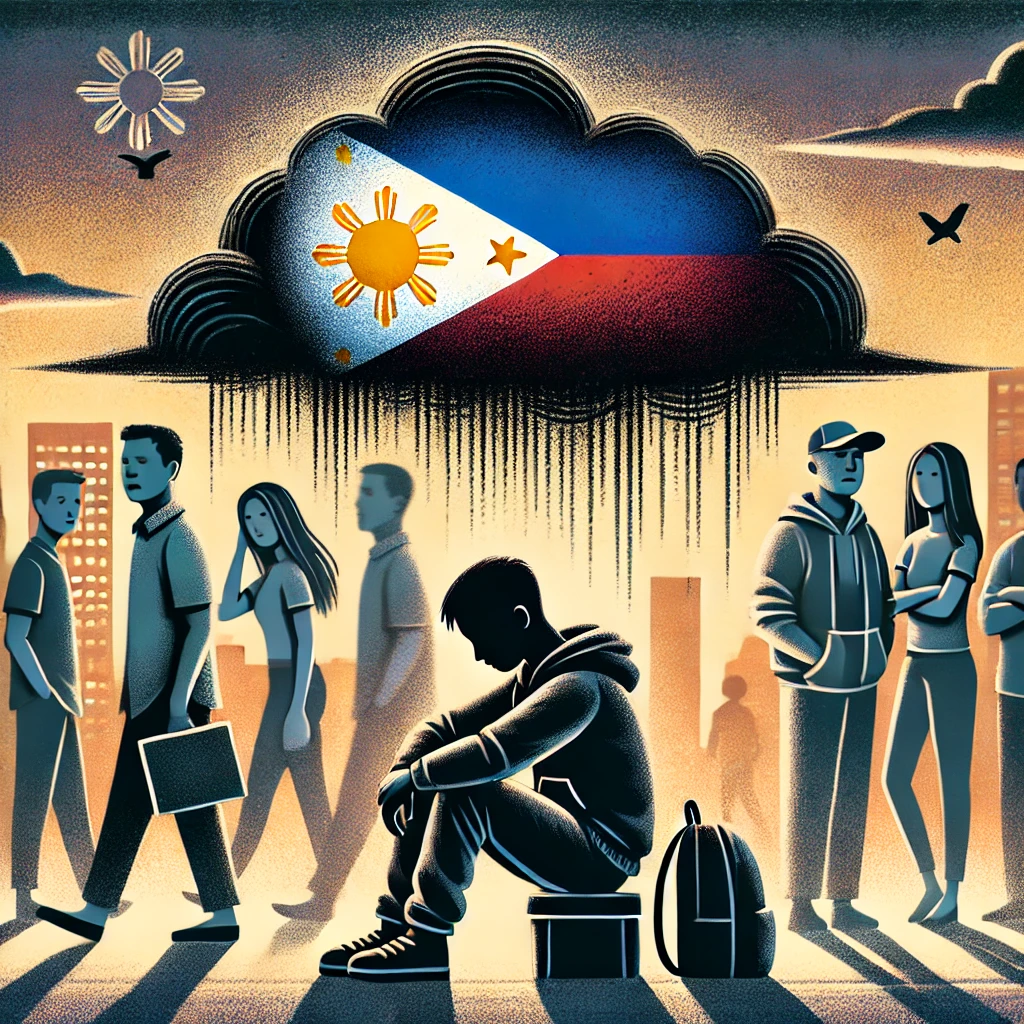Mental health is often a difficult topic to discuss openly in the Philippines. Many people struggle in silence due to the stigma that surrounds mental health issues, particularly when it comes to seeking help from professionals such as a Psychiatrist in the Philippines or a Psychologist. According to the World Health Organization, over 6 million Filipinos are affected by depression and anxiety, yet only a fraction of those in need receive professional help. The stigma associated with mental illness is one of the main reasons behind this gap in mental health care. Research suggests that people in the Philippines often fear being labeled “crazy” or worry about damaging their family’s reputation by admitting to mental health struggles (Tanaka et al., 2018).
This fear and hesitation are not unfounded. In a culture where mental health issues are often seen as a personal or family failure, seeking help becomes a last resort for many. This hesitation has real consequences. A 2018 study showed that Filipinos delay seeking mental health treatment for an average of two years due to societal stigma (Tanaka et al., 2018). This delay can have devastating effects, not only on the individuals suffering but also on their families and communities. Without timely intervention, mental health conditions can worsen, making recovery more difficult and costly in the long run. It’s time to change the conversation around mental health in the Philippines by addressing the stigma head-on.
What Does Mental Health Stigma Feel Like?
Stigma is more than just a label; it is a powerful force that impacts nearly every aspect of life for those dealing with mental health challenges. In the Philippines, the stigma attached to mental illness is deeply rooted in cultural beliefs. Many people still see mental illness as a personal or family failure, a belief that makes it even more difficult for individuals to seek help. According to a study conducted by Tanaka et al. (2018), mental illness in the Philippines is often viewed as a “disease of the family,” which can cause both the individual and their family to be ostracized.
This type of stigma manifests in various ways. Some individuals may face direct discrimination from friends, coworkers, or even family members. Others may experience more subtle forms of prejudice, such as being left out of social gatherings or being the subject of gossip. Over time, these experiences can erode a person’s self-esteem and lead to feelings of isolation. The consequences of this are not just emotional. Studies show that people who experience stigma are less likely to seek help, more likely to drop out of treatment, and often face worse mental health outcomes as a result (Tanaka et al., 2018). The cultural pressure to hide mental health problems creates a vicious cycle: the more people hide their struggles, the more isolated they feel, and the more difficult it becomes to reach out for help.
Moreover, the concept of hiya or shame plays a significant role in this stigma. In Filipino culture, hiya is a deeply ingrained value that emphasizes the importance of saving face and maintaining one’s dignity in the eyes of others. Admitting to a mental health problem is often seen as a loss of face, not just for the individual but for their entire family. This cultural pressure can paralyze many, preventing them from seeking help even when they need it. It’s crucial to understand that mental health is not a reflection of one’s character or family status. Shifting this cultural mindset is key to reducing the stigma and encouraging more people to seek the care they deserve.

Misunderstandings About Mental Health in the Philippines
Many misconceptions surround mental health in the Philippines, leading to negative stereotypes about people who seek help from a Psychiatrist or Psychologist. According to research, some Filipinos believe that mental health problems are the result of a weak character or a punishment from God (Tanaka et al., 2018). This belief discourages people from accessing care, as they fear being seen as lacking in moral strength. In fact, mental illness is often misunderstood as a personal failure or weakness rather than a medical condition that requires professional treatment.
One of the most pervasive misconceptions is that mental health issues are something people should be able to “snap out of” on their own. Many Filipinos believe that with enough willpower, a person should be able to overcome depression, anxiety, or other mental health challenges without needing to see a professional. This belief puts an unfair burden on those suffering, as it minimizes the severity of their condition and invalidates their need for help. It also contributes to the stigma that surrounds mental health care, making it harder for people to seek treatment from a Psychiatrist clinic in Makati or a Psychologist clinic. The truth is, mental health conditions are complex and often require a combination of therapy, medication, and support to manage effectively.
Another common misconception is that mental illness is a lifelong disability that makes it impossible for someone to live a normal life. This pessimistic view can lead to social exclusion and discrimination in the workplace, schools, and even within families. People with mental health issues are often seen as unreliable or incapable, which can prevent them from accessing opportunities for personal and professional growth. This misunderstanding not only harms the individual but also contributes to the broader societal stigma that keeps mental health issues in the shadows. In reality, with proper treatment and support, many people with mental health conditions can lead fulfilling, productive lives.
The Impact of Stigma: Delayed Access to Help
The stigma surrounding mental health in the Philippines often leads to delayed or complete avoidance of professional care. In many cases, individuals wait years before seeking help from a Psychiatrist or Psychologist, by which time their condition may have worsened. Tanaka et al. (2018) highlight that many Filipinos delay seeking treatment for an average of two years after recognizing their symptoms, primarily due to stigma. This delay can result in more severe mental health conditions and, in extreme cases, lead to suicide.
Delayed access to mental health care not only worsens individual outcomes but also puts a strain on families and communities. As mental health conditions go untreated, they often become more complicated and harder to manage. Families may struggle to care for a loved one who is experiencing severe mental health issues, leading to emotional and financial strain. According to the study by Tanaka et al. (2018), many families in the Philippines experience significant economic challenges as a result of caring for a family member with a mental illness. In some cases, families may even face social isolation themselves due to the stigma surrounding mental health issues, further exacerbating the problem.
Moreover, delayed treatment can lead to a cycle of worsening mental health and decreased quality of life. Individuals who do not receive timely care are more likely to experience long-term complications, such as chronic anxiety, depression, or substance abuse. These conditions can impair their ability to function in daily life, limiting their social interactions, job prospects, and overall well-being. Addressing the stigma and encouraging early intervention is crucial in preventing this downward spiral and promoting better mental health outcomes for individuals and their families.
Simple Ways You Can Advocate for Mental Health Awareness
Despite the challenges posed by stigma, there are ways to advocate for mental health awareness and help reduce the negative stereotypes associated with mental illness. Open, honest conversations are among the most powerful ways to fight stigma. By talking about mental health with friends and family, we can help normalize it and encourage others to seek help from professionals like Psychologists or Psychiatrists in Makati.
Education is another critical tool in the fight against mental health stigma. Schools, workplaces, and community organizations can play a key role in promoting mental health awareness and providing resources for those in need. Mental health education should focus on dispelling myths, promoting empathy, and teaching practical strategies for managing stress, anxiety, and other common mental health issues. Encouraging people to see mental health professionals, such as those at a Psychiatrist clinic in Makati or Psychologist clinic, can help shift the narrative from one of fear and stigma to one of support and understanding.
Community-based support, grounded in the Filipino value of “Bayanihan” (the spirit of communal unity and cooperation), can also play a crucial role in reducing stigma. Tanaka et al. (2018) found that in some cases, community support helped mitigate the negative effects of stigma. For example, neighbors and community members who provided emotional and practical support to people with mental health issues were able to alleviate some of the social isolation and discrimination that they faced. By fostering a sense of community and support, we can help individuals feel more accepted and less isolated, encouraging them to seek the care they need.

Finding Professional Support in the Philippines
Whether you’re looking for a Psychiatrist in Makati or a Psychologist clinic in Makati, professional help is available. Psychiatrists can assist with medication management for conditions like depression, anxiety, or bipolar disorder, while Psychologists provide therapy and counseling services to help individuals work through emotional and psychological challenges. It’s important to remember that seeking help is a sign of strength, not weakness.
Finding the right professional support can be the first step toward recovery. Whether through medication, therapy, or a combination of both, mental health professionals can provide the tools and strategies needed to manage mental health conditions effectively. Additionally, iPsych offers more accessible and affordable services, making it easier for individuals from all backgrounds to receive the care they need. The key is to take that first step and reach out for help.
Mental health stigma in the Philippines is a serious issue that prevents many people from seeking the care they need. It’s time to break the silence and start treating mental health with the importance it deserves. Whether you’re considering seeing a Psychiatrist or Psychologist, the most
important step is reaching out for help. You don’t have to face these challenges alone—there are professionals ready to support you.
If you’ve been hesitant to seek help, know that we’re here to support you. At our Psychiatrist and Psychologist clinic in Makati, we offer a compassionate, understanding approach to mental health care.
Reach out today and let us help you on your journey to better mental health.
Let’s connect
Contact iPsych through the channels below.
Address: 1801 Centuria Medical Makati Century City Gen. Luna St, cor Salamanca, St. Brgy, Poblacion Makati, Metro Manila

Designed by Design Manila | Privacy Policy | Patient Agreement | Site Map



